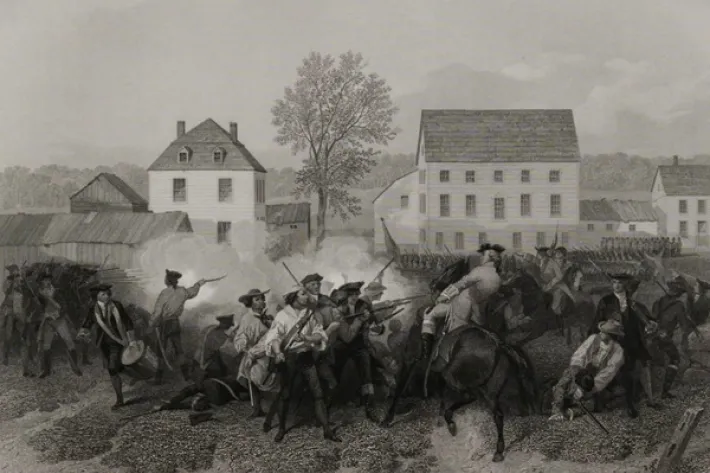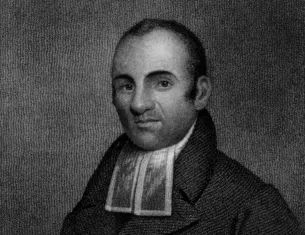“The Battle of Lexington,” 1775

"Battle of Lexington," engraved by James David Smillie, published by Martin, Johnson, and Co. (Gilder Lehrman Institute)
As an African American soldier, Haynes firmly believed in the ideals of the American Revolution. He wrote this patriotic poem soon after the Battle of Lexington and circulated it in manuscript. It remained unpublished until 1985, when the manuscript was rediscovered.
Excerpts from Lemuel Haynes’s “The Battle of Lexington,” 1775 (published 1985)
1
Some Seraph now my Breast inspire
whilst my Urania sings
while She would try her solemn Lyre
Upon poetic Strings.
2
Some gloomy Vale or gloomy Seat
where Sable veils the sky
Become that Tongue that wd repeat
The dreadfull Tragedy
3
The Nineteenth Day of April last
We ever shall retain
As monumental of the past
most bloody shocking Scene
4
Then Tyrants fill’d wth horrid Rage
A fatal Journey went
& Unmolested to engage
And slay the innocent
5
Then did we see old Bonner rise
And, borrowing Spite from Hell
They stride along with magic Eyes
where Sons of Freedom dwell
6
At Lexington they did appear
Array’d in hostile Form
And tho our Friends were peacefull there
Yet on them fell the Storm
7
Eight most unhappy Victims fell
Into the Arms of Death
unpitied by those Tribes of Hell
who curs’d them wth their Breath
8
The Savage Band still march along
For Concord they were bound
while Oaths & Curses from their Tongue
Accent with hellish Sound
9
To prosecute their fell Desire
At Concord they unite
Two Sons of Freedom there expire
By their tyrannic Spite
10
Thus did our Friends endure their Rage
without a murm’ring Word
Till die they must or else engage
and join with one Accord
11
Such Pity did their Breath inspire
That long they bore the Rod
And with Reluctance they conspire
to shed the human Blood
12
But Pity could no longer sway
Tho’ ’t is a pow’rfull Band
For Liberty now bleeding lay
And calld them to withstand
13
The Awfull Conflict now begun
To rage with furious Pride
And Blood in great Effusion run
From many a wounded Side
14
For Liberty, each Freeman Strives
As its a Gift of God
And for it willing yield their Lives
And Seal it with their Blood
15
Thrice happy they who thus resign
Into the peacefull Grave
Much better there, in Death Confin’d
Than a Surviving Slave
16
This Motto may adorn their Tombs,
(Let tyrants come and view)
“We rather seek these silent Rooms
Than live as Slaves to You” . . .
Source: Lemuel Haynes, “The Battle of Lexington” (wr. 1775), printed in Ruth Bogin, “‘The Battle of Lexington’: A Patriotic Ballad by Lemuel Haynes,” William and Mary Quarterly 42, no. 4 (October 1985): 501–504.
Lemuel Haynes’s “The Battle of Lexington,” 1775 (published 1985)
. . . 3
The Nineteenth Day of April last
We ever shall retain
As monumental of the past
most bloody shocking Scene
. . . 6
At Lexington they did appear
Array’d in hostile Form
And tho our Friends were peacefull there
Yet on them fell the Storm
7
Eight most unhappy Victims fell
Into the Arms of Death
unpitied by those Tribes of Hell
who curs’d them wth their Breath
8
The Savage Band still march along
For Concord they were bound
while Oaths & Curses from their Tongue
Accent with hellish Sound
9
To prosecute their fell Desire
At Concord they unite
Two Sons of Freedom there expire
By their tyrannic Spite
10
Thus did our Friends endure their Rage
without a murm’ring Word
Till die they must or else engage
and join with one Accord
11
Such Pity did their Breath inspire
That long they bore the Rod
And with Reluctance they conspire
to shed the human Blood
12
But Pity could no longer sway
Tho’ ’t is a pow’rfull Band
For Liberty now bleeding lay
And calld them to withstand
13
The Awfull Conflict now begun
To rage with furious Pride
And Blood in great Effusion run
From many a wounded Side
14
For Liberty, each Freeman Strives
As its a Gift of God
And for it willing yield their Lives
And Seal it with their Blood
15
Thrice happy they who thus resign
Into the peacefull Grave
Much better there, in Death Confin’d
Than a Surviving Slave
16
This Motto may adorn their Tombs,
(Let tyrants come and view)
“We rather seek these silent Rooms
Than live as Slaves to You”
Source: Lemuel Haynes, “The Battle of Lexington” (wr. 1775), printed in Ruth Bogin, “‘The Battle of Lexington’: A Patriotic Ballad by Lemuel Haynes,” William and Mary Quarterly 42, no. 4 (October 1985): 501–504.
effusion - the escape of fluid
Background
As an African American soldier, Haynes firmly believed in the ideals of the American Revolution. He wrote this patriotic poem soon after the Battle of Lexington and circulated it in manuscript. It remained unpublished until 1985, when the manuscript was rediscovered.
Transcript
Excerpts from Lemuel Haynes’s “The Battle of Lexington,” 1775 (published 1985)
1
Some Seraph now my Breast inspire
whilst my Urania sings
while She would try her solemn Lyre
Upon poetic Strings.
2
Some gloomy Vale or gloomy Seat
where Sable veils the sky
Become that Tongue that wd repeat
The dreadfull Tragedy
3
The Nineteenth Day of April last
We ever shall retain
As monumental of the past
most bloody shocking Scene
4
Then Tyrants fill’d wth horrid Rage
A fatal Journey went
& Unmolested to engage
And slay the innocent
5
Then did we see old Bonner rise
And, borrowing Spite from Hell
They stride along with magic Eyes
where Sons of Freedom dwell
6
At Lexington they did appear
Array’d in hostile Form
And tho our Friends were peacefull there
Yet on them fell the Storm
7
Eight most unhappy Victims fell
Into the Arms of Death
unpitied by those Tribes of Hell
who curs’d them wth their Breath
8
The Savage Band still march along
For Concord they were bound
while Oaths & Curses from their Tongue
Accent with hellish Sound
9
To prosecute their fell Desire
At Concord they unite
Two Sons of Freedom there expire
By their tyrannic Spite
10
Thus did our Friends endure their Rage
without a murm’ring Word
Till die they must or else engage
and join with one Accord
11
Such Pity did their Breath inspire
That long they bore the Rod
And with Reluctance they conspire
to shed the human Blood
12
But Pity could no longer sway
Tho’ ’t is a pow’rfull Band
For Liberty now bleeding lay
And calld them to withstand
13
The Awfull Conflict now begun
To rage with furious Pride
And Blood in great Effusion run
From many a wounded Side
14
For Liberty, each Freeman Strives
As its a Gift of God
And for it willing yield their Lives
And Seal it with their Blood
15
Thrice happy they who thus resign
Into the peacefull Grave
Much better there, in Death Confin’d
Than a Surviving Slave
16
This Motto may adorn their Tombs,
(Let tyrants come and view)
“We rather seek these silent Rooms
Than live as Slaves to You” . . .
Source: Lemuel Haynes, “The Battle of Lexington” (wr. 1775), printed in Ruth Bogin, “‘The Battle of Lexington’: A Patriotic Ballad by Lemuel Haynes,” William and Mary Quarterly 42, no. 4 (October 1985): 501–504.
Excerpt
Lemuel Haynes’s “The Battle of Lexington,” 1775 (published 1985)
. . . 3
The Nineteenth Day of April last
We ever shall retain
As monumental of the past
most bloody shocking Scene
. . . 6
At Lexington they did appear
Array’d in hostile Form
And tho our Friends were peacefull there
Yet on them fell the Storm
7
Eight most unhappy Victims fell
Into the Arms of Death
unpitied by those Tribes of Hell
who curs’d them wth their Breath
8
The Savage Band still march along
For Concord they were bound
while Oaths & Curses from their Tongue
Accent with hellish Sound
9
To prosecute their fell Desire
At Concord they unite
Two Sons of Freedom there expire
By their tyrannic Spite
10
Thus did our Friends endure their Rage
without a murm’ring Word
Till die they must or else engage
and join with one Accord
11
Such Pity did their Breath inspire
That long they bore the Rod
And with Reluctance they conspire
to shed the human Blood
12
But Pity could no longer sway
Tho’ ’t is a pow’rfull Band
For Liberty now bleeding lay
And calld them to withstand
13
The Awfull Conflict now begun
To rage with furious Pride
And Blood in great Effusion run
From many a wounded Side
14
For Liberty, each Freeman Strives
As its a Gift of God
And for it willing yield their Lives
And Seal it with their Blood
15
Thrice happy they who thus resign
Into the peacefull Grave
Much better there, in Death Confin’d
Than a Surviving Slave
16
This Motto may adorn their Tombs,
(Let tyrants come and view)
“We rather seek these silent Rooms
Than live as Slaves to You”
Source: Lemuel Haynes, “The Battle of Lexington” (wr. 1775), printed in Ruth Bogin, “‘The Battle of Lexington’: A Patriotic Ballad by Lemuel Haynes,” William and Mary Quarterly 42, no. 4 (October 1985): 501–504.
effusion - the escape of fluid
